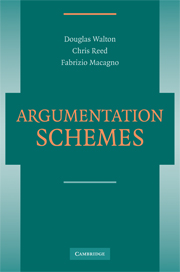Book contents
- Frontmatter
- Contents
- Acknowledgments
- Introduction
- 1 Basic Tools in the State of the Art
- 2 Schemes for Argument from Analogy, Classification, and Precedent
- 3 Knowledge-Related, Practical, and Other Schemes
- 4 Arguments from Generally Accepted Opinions, Commitment, and Character
- 5 Causal Argumentation Schemes
- 6 Schemes and Enthymemes
- 7 Attack, Rebuttal, and Refutation
- 8 The History of Schemes
- 9 A User's Compendium of Schemes
- 10 Refining the Classification of Schemes
- 11 Formalizing Schemes
- 12 Schemes in Computer Systems
- Bibliography
- Index
3 - Knowledge-Related, Practical, and Other Schemes
Published online by Cambridge University Press: 05 June 2012
- Frontmatter
- Contents
- Acknowledgments
- Introduction
- 1 Basic Tools in the State of the Art
- 2 Schemes for Argument from Analogy, Classification, and Precedent
- 3 Knowledge-Related, Practical, and Other Schemes
- 4 Arguments from Generally Accepted Opinions, Commitment, and Character
- 5 Causal Argumentation Schemes
- 6 Schemes and Enthymemes
- 7 Attack, Rebuttal, and Refutation
- 8 The History of Schemes
- 9 A User's Compendium of Schemes
- 10 Refining the Classification of Schemes
- 11 Formalizing Schemes
- 12 Schemes in Computer Systems
- Bibliography
- Index
Summary
In this chapter, we outline a number of schemes that do not fall into any single classification but are useful to know about before considering the schemes discussed in the next chapters. We begin with a group of schemes based on assumptions about knowledge and go on to consider a group related to actions, goals, and means. These latter include schemes representing practical reasoning and arguing from the consequences of an action that is being considered. Finally, we consider some other schemes that are not easily classified, including arguments from composition and division, fear appeal arguments, appeals to pity, and argument from alternatives and opposites. Some work has been done on some of these schemes, while others remain largely unstudied.
ARGUMENTS FROM KNOWLEDGE
In arguments from expert opinion, position to know, and witness testimony, the acceptability of the conclusion is drawn from a knowledge base that the source is assumed to have access to. The relation between the latter and the plausibility of the conclusion is based on a kind of default reasoning: it is assumed that the proposition in question is contained in a certain subject domain that is known by the source. For this reason, it is an assumption in this kind of argumentation that many or most of the true propositions of the domain are known. The warrant of this kind of argumentation is therefore closely similar to that of the argument from ignorance.
Information
- Type
- Chapter
- Information
- Argumentation Schemes , pp. 87 - 120Publisher: Cambridge University PressPrint publication year: 2008
